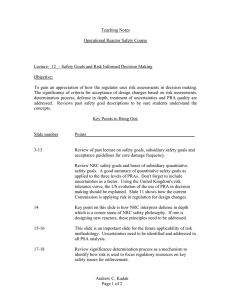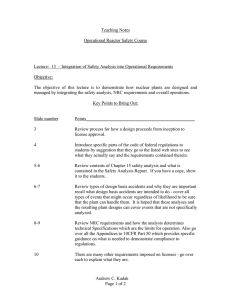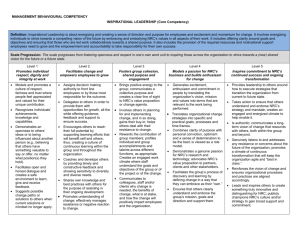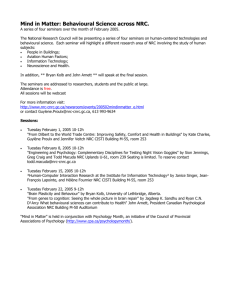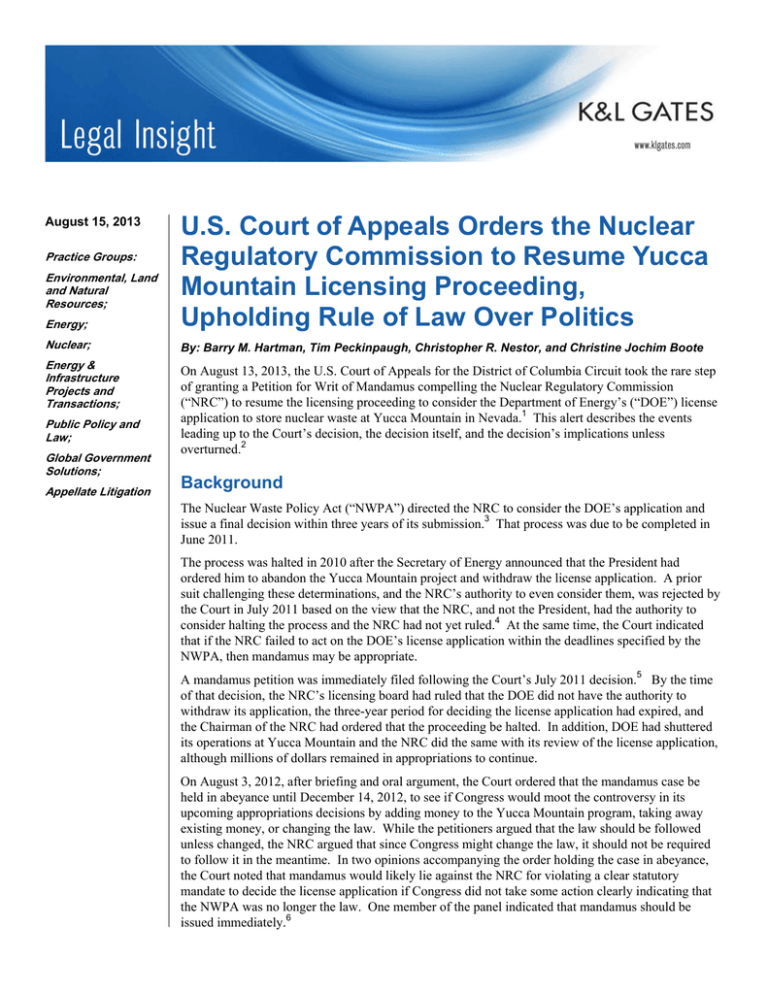
Energy;
U.S. Court of Appeals Orders the Nuclear
Regulatory Commission to Resume Yucca
Mountain Licensing Proceeding,
Upholding Rule of Law Over Politics
Nuclear;
By: Barry M. Hartman, Tim Peckinpaugh, Christopher R. Nestor, and Christine Jochim Boote
Energy &
Infrastructure
Projects and
Transactions;
On August 13, 2013, the U.S. Court of Appeals for the District of Columbia Circuit took the rare step
of granting a Petition for Writ of Mandamus compelling the Nuclear Regulatory Commission
(“NRC”) to resume the licensing proceeding to consider the Department of Energy’s (“DOE”) license
application to store nuclear waste at Yucca Mountain in Nevada.1 This alert describes the events
leading up to the Court’s decision, the decision itself, and the decision’s implications unless
overturned.2
August 15, 2013
Practice Groups:
Environmental, Land
and Natural
Resources;
Public Policy and
Law;
Global Government
Solutions;
Appellate Litigation
Background
The Nuclear Waste Policy Act (“NWPA”) directed the NRC to consider the DOE’s application and
issue a final decision within three years of its submission.3 That process was due to be completed in
June 2011.
The process was halted in 2010 after the Secretary of Energy announced that the President had
ordered him to abandon the Yucca Mountain project and withdraw the license application. A prior
suit challenging these determinations, and the NRC’s authority to even consider them, was rejected by
the Court in July 2011 based on the view that the NRC, and not the President, had the authority to
consider halting the process and the NRC had not yet ruled.4 At the same time, the Court indicated
that if the NRC failed to act on the DOE’s license application within the deadlines specified by the
NWPA, then mandamus may be appropriate.
A mandamus petition was immediately filed following the Court’s July 2011 decision.5 By the time
of that decision, the NRC’s licensing board had ruled that the DOE did not have the authority to
withdraw its application, the three-year period for deciding the license application had expired, and
the Chairman of the NRC had ordered that the proceeding be halted. In addition, DOE had shuttered
its operations at Yucca Mountain and the NRC did the same with its review of the license application,
although millions of dollars remained in appropriations to continue.
On August 3, 2012, after briefing and oral argument, the Court ordered that the mandamus case be
held in abeyance until December 14, 2012, to see if Congress would moot the controversy in its
upcoming appropriations decisions by adding money to the Yucca Mountain program, taking away
existing money, or changing the law. While the petitioners argued that the law should be followed
unless changed, the NRC argued that since Congress might change the law, it should not be required
to follow it in the meantime. In two opinions accompanying the order holding the case in abeyance,
the Court noted that mandamus would likely lie against the NRC for violating a clear statutory
mandate to decide the license application if Congress did not take some action clearly indicating that
the NWPA was no longer the law. One member of the panel indicated that mandamus should be
issued immediately.6
U.S. Court of Appeals Orders the Nuclear Regulatory
Commission to Resume Yucca Mountain Licensing
Proceeding, Upholding Rule of Law Over Politics
The Court’s August 13, 2013 Mandamus Decision
The Court, in a 2-1 decision, stated:
Since we issued that order more than a year ago on August 3,
2012, the [NRC] has not acted, and Congress has not altered the
legal landscape. As things stand, therefore, the [NRC] is
simply flouting the law. In light of the Constitutional response
owed to Congress, and having fully exhausted alternatives
available to us, we now grant the petition for writ of mandamus
against the [NRC].7
The Court rejected all of the arguments the NRC put forth to justify its failure to follow the NWPA.
First, it rejected the NRC’s argument that it could not proceed with the license proceeding because
Congress had not yet appropriated the full amount of funding necessary to complete the entire
proceeding.8 The Court held that “[f]ederal agencies may not ignore statutory mandates simply
because Congress has not yet appropriated all of the money necessary to complete a project.”9 Rather,
the Court concluded, the NRC is under a legal obligation to continue the licensing proceeding with the
funds available to it - in this case, at least $11.1 million in appropriated funds.10
Next, the Court rejected the NRC’s argument that it would be a waste of money to continue the
licensing proceeding based on the NRC’s speculation that Congress, in the future, might not
appropriate the additional funds necessary to complete the proceeding.11 The Court said, “an agency
may not rely on political guesswork about future congressional appropriations as a basis for violating
existing legal mandates.”12 In fact, the Court recognized that doing so would “gravely upset the
balance of powers between the Branches and represent a major and unwarranted expansion of the
Executive’s power at the expense of Congress.”13
The Court also rejected the NRC’s argument that the failure of Congress to provide future
appropriations for the Yucca Mountain project demonstrated congressional intent to shut down the
process.14 The Court explained that “courts generally should not infer that Congress has implicitly
repealed or suspended statutory mandates based simply on the amount of money Congress has
appropriated.”15 The Court concluded that, in this case, “where previously appropriated money
remained available for an agency to perform a statutorily mandated activity,” there is “no basis for a
court to excuse the agency from that statutory mandate.”16
The Court further rejected what it saw as an undisputed implication in the record - that the NRC’s
(and the Obama administration’s) policy disagreement with Congress over the wisdom of the NWPA
is a lawful ground for the NRC to decline to continue with the licensing proceeding. “[T]he President
and federal agencies may not ignore statutory mandates or prohibitions merely because of a policy
disagreement with Congress.”17
The dissent contended that mandamus should not issue because there were insufficient funds to
conclude the process and the NRC’s judgment over the wisdom of spending the remaining funds
should be given deference. The majority disagreed, finding that significant money remained, and the
NRC’s conduct too egregious to overlook:
2
U.S. Court of Appeals Orders the Nuclear Regulatory
Commission to Resume Yucca Mountain Licensing
Proceeding, Upholding Rule of Law Over Politics
Our respectful factbound difference with Chief Judge Garland,
then, is simply that we believe – especially given the Court’s
cautious and incremental approach in prior iterations of this
litigation, the significant amount of money available for the
[NRC] to continue the licensing process, and the [NRC’s]
continued disregard of the law – that the case has by now
proceeded to the point where mandamus appropriately must
be granted.18
The Court concluded its opinion by noting that “[a]t the behest of the [NRC], we have repeatedly gone
out of our way over the last several years to defer a mandamus order against the [NRC] and thereby
give Congress time to pass new legislation that would clarify this matter if it so wished.”19 In light of
the fact that “Congress has taken no further action on this matter,” the Court held that, at this point,
the NRC “is simply defying a law enacted by Congress, and . . . doing so without any legal basis.”20
What Does the Court’s Mandamus Decision Mean?
Under the Court’s rules, its order granting mandamus will become effective September 3, 2013 absent
issuance of an order or other special direction of the Court to the contrary.21 The NRC has the right to
petition the Court for a stay, rehearing by the panel, and rehearing en banc, and may also file a
petition for certiorari to the United States Supreme Court, though the NRC’s burden under any of
these options is quite high.
Administratively, the licensing process must be resumed. Regardless of whether it can be fully
completed, the NRC acknowledged at oral argument before the Court that it had more than enough
resources to issue the key Safety Evaluation Reports that address NRC scientist views on the safety of
Yucca Mountain as a permanent waste repository.22 Releasing those reports may well impact the
availability of additional resources from Congress to continue the process. Additionally, given the
Court’s decision ordering the NRC to move forward with the licensing proceeding, the prior ruling by
the NRC’s Atomic Safety and Licensing Board that DOE did not have the authority to withdraw its
application, 23 and the Secretary of Energy’s statements that he will abide by the Court’s order, DOE
will presumably cooperate and proceed with the license application review process as required by the
NWPA.
Politically, the case moves the debate over whether the current NWPA should be amended back to
Congress where it belongs. Nuclear power remains one of the cleanest and most reliable source of
baseload energy, and the handling of commercial nuclear waste remains a key issue in the debate over
the role nuclear power will play in the country’s future energy mix.
Jurisprudentially, the decision makes it abundantly clear that the Executive Branch, absent
constitutional objections, may not choose to ignore implementing a law containing clear and
unmistakable requirements unless Congress changes it. Few mandamus cases in the past have
presented facts where an agency publicly announced its disagreement with the law and, instead of
seeking a legislative change, simply abandoned its obligations to implement it. The opinion
represents a reaffirmation of the role that Congress plays in this process and preserves important
separation of powers principles. As the Court noted, “[i]t is no overstatement to say that our
constitutional system of separation of powers would be significantly altered if we were to allow
3
U.S. Court of Appeals Orders the Nuclear Regulatory
Commission to Resume Yucca Mountain Licensing
Proceeding, Upholding Rule of Law Over Politics
executive and independent agencies to disregard federal law in the manner asserted in this case by the
[NRC].”24
Authors:
Barry M. Hartman
barry.hartman@klgates.com
+1.202.778.9338
Tim L. Peckinpaugh
tim.peckinpaugh@klgates.com
+1. 202.661.6265
Christopher R. Nestor
christopher.nestor@klgates.com
+1. 717.231.4812
Christine Jochim Boote
Christine.Boote@klgates.com
+1. 202.778.9222
Anchorage Austin Beijing Berlin Boston Brisbane Brussels Charleston Charlotte Chicago Dallas Doha Dubai Fort Worth Frankfurt
Harrisburg Hong Kong Houston London Los Angeles Melbourne Miami Milan Moscow Newark New York Orange County Palo Alto Paris
Perth Pittsburgh Portland Raleigh Research Triangle Park San Diego San Francisco São Paulo Seattle Seoul Shanghai Singapore Spokane
Sydney Taipei Tokyo Warsaw Washington, D.C. Wilmington
K&L Gates practices out of 48 fully integrated offices located in the United States, Asia, Australia, Europe, the
Middle East and South America and represents leading global corporations, growth and middle-market companies,
capital markets participants and entrepreneurs in every major industry group as well as public sector entities,
educational institutions, philanthropic organizations and individuals. For more information about K&L Gates or its
locations, practices and registrations, visit www.klgates.com.
This publication is for informational purposes and does not contain or convey legal advice. The information herein should not be used or relied upon in
regard to any particular facts or circumstances without first consulting a lawyer.
©2013 K&L Gates LLP. All Rights Reserved.
1
Opinion, In re: Aiken Cty., No. 11-1271 (D.C. Cir. Aug. 13, 2013).
K&L Gates represented three of the petitioners in this litigation.
3
42 U.S.C. § 10134(d). The NWPA allowed the NRC to extend the deadline by one year if it issued a
written report explaining the reason for the delay and providing an estimated time for completion. Id. at
§§ 10134(d), (e)(2).
4
In re: Aiken Cty., 645 A.2d 428 (D.C. Cir. 2011).
2
4
U.S. Court of Appeals Orders the Nuclear Regulatory
Commission to Resume Yucca Mountain Licensing
Proceeding, Upholding Rule of Law Over Politics
5
In re: Aiken Cty., No. 11-1271 (D.C. Cir.). The mandamus case was brought in a single petition against
the NRC by three residents of Washington, the States of Washington and South Carolina, and Aiken
County, South Carolina, all of whom are directly affected by where nuclear waste is currently being stored
in the absence of a long-term storage site. Nye County, Nevada, where Yucca Mountain is located, was
also a petitioner, as was the National Association of Regulatory Utility Commissioners. The prior case,
which resulted in the Court’s July 2011 decision, involved multiple separate petitions brought by the
residents, the States of Washington and South Carolina, and Aiken County, which named various
defendants including the President, the Secretary of Energy and the NRC.
6
In re: Aiken County, 2012 U.S. App. LEXIS 16093 (D.C. Cir. Aug. 3, 2012).
7
Opinion, In re: Aiken Cty., No. 11-1271 (D.C. Cir. Aug. 13, 2013) at 5. The opinion of the Court was
filed by Circuit Judge Kavanaugh, with whom Senior Circuit Judge Randolph joined, except as to Part III
of the opinion. Chief Judge Garland filed a dissenting opinion.
8
Id. at 6.
9
Id. at 6-7.
10
Id. at 7.
11
Id.
12
Id.
13
Id.
14
Id.
15
Id. at 8.
16
Id.
17
Id. at 9 (citations omitted).
18
Id. at 20-21 & n.12.
19
Id. at 20.
20
Id.
21
See D.C. Cir. R. 41(a)(3).
22
Transcript of Oral Argument, In re: Aiken Cty., No. 11-1271 (D.C. Cir. May 2, 2012) at 27.
23
See Order of ASLB, In re: U.S. Dep’t of Energy, Docket No. 63-001-HLW, ASLBP No. 09-892-HLWCAB-04 (June 29, 2010).
24
Opinion, In re: Aiken Cty., No. 11-1271 (D.C. Cir. Aug. 13, 2013) at 21-22. 5


